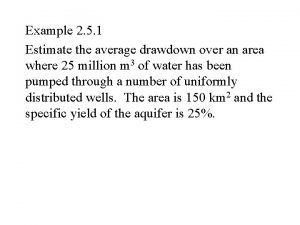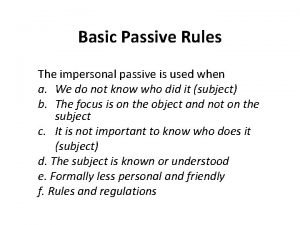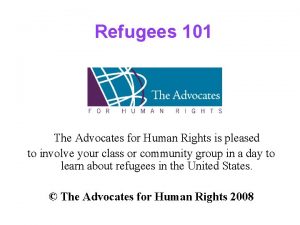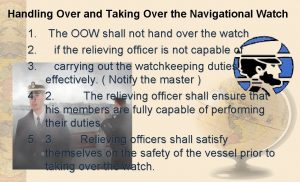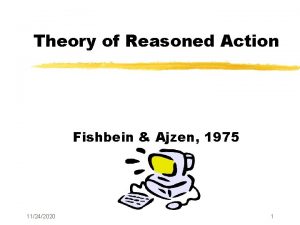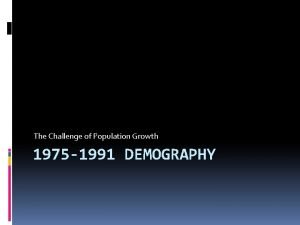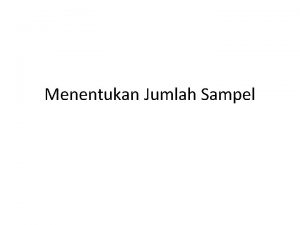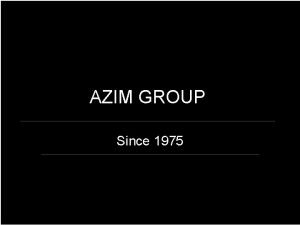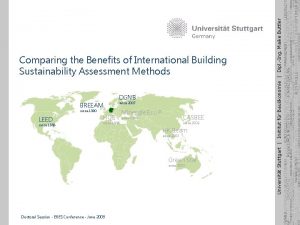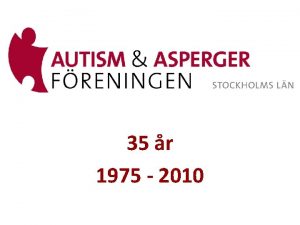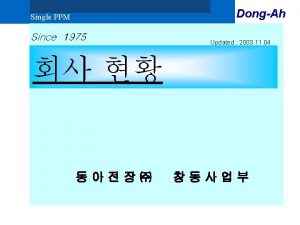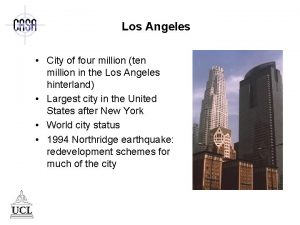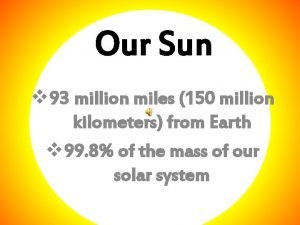Refugees Refugees Since 1975 over 3 million refugees





















- Slides: 21

Refugees


Refugees Since 1975 over 3 million refugees have resettled in the United States. Refugees legally enter the United States in search of freedom, peace, and opportunity for themselves and their families. Persons are admitted as refugees after they are granted status by the Bureau of Population, Refugees, and Migration at the U. S. Department of State and by the Bureau of Citizenship and Immigration Services at the U. S. Department of Homeland Security.

1975 1976 1977 1978 1979 1980 1981 1982 1983 1984 1985 1986 1987 1988 1989 1990 1991 1992 1993 1994 1995 1996 1997 1998 1999 2000 2001 2002 2003 2004 2005 2006 2007 2008 2009 2010 2011 2012 Arrivals Refugee Admissions 250, 000 200, 000 Africa 150, 000 East Asia Europe Former Soviet Union 100, 000 Kosovo Latin America/ Caribbean PSI 50, 000 Near East/ South Asia 0 Fiscal Year

October 1, 2012 – February 28, 2013

Refugee Arrivals Year United States Iowa 2003 39, 550 227 2004 79, 432 461 2005 69, 702 281 2006 57, 979 356 2007 48, 281 435 2008 60, 191 564 2009 74, 654 909 2010 73, 311 330 2011 56, 424 334 2012 58, 238 439

Core Services Basic needs first 30 days Housing Food Clothing Apply for Social Security Card Refugee physical Enroll children in school Refer for employment services Orientation

Basic Assistance Refugee Cash Assistance – Limit 8 months Grant $183 single and $361 couple Refugee Medical Assistance – Limit 8 mos FIP – 5 year life time limit § Cash Assistance – 183, 361, 426, 495, 548, 610 § Title XIX • Food Stamps

Refugee Resettlement in Iowa Pre 1975 – 1993 – 2001 Post 9/11/01 – 2008 – Present Future? ? ?

Pre 1975 Post World War II – Displaced Persons Faith Based No Federal Refugee Resettlement Program No State Refugee Resettlement Program


Iowa Bureau of Refugee Services The Bureau of Refugee Services can trace its roots back to 1975 when Governor Robert Ray established the Governor's Task Force for Indochinese Resettlement. Since that time, the State of Iowa has developed a wonderful history of assisting thousands of refugees to settle in a new land start a new life.

1975 - 1993 Priority of Governor Emphasis on Employment Southeast Asians State Wide Sponsors/Volunteers Federal Safety Net

1993 - 2001 Southeast Asian program slowing down End of Cold War and Former Soviet Union Bosnian Resettlement primarily in few counties Welfare Reform Reduction of Federal Resettlement Funds More dependence on refugee relatives and fewer sponsors

Post 9/11 - 2008 New security and processing procedures Low arrivals – end of Bosnian resettlement and all but few Vietnamese African resettlement becomes primary Resettlement eventually focused in Polk County Agency resettlement rather than sponsors

2008 - Present Burmese, Bhutanese, and Iraqi cases Resettlement concentrated in Des Moines Financial crisis – more limited services Case load high need and high barrier Lutheran Services of Iowa and Bureau of Refugee Services stop resettling refugees New resettlement agencies Increasing secondary migration

Future Trends Inadequate federal funding Affordable Care Act Frequently changing refugee populations that are being resettled – multiple languages On going secondary migration Resettlement concentrated in very limited locations Increasing need for state, local, private funding and resources

Challenges and Opportunities Housing Mental Health Case Management Emergency Assistance ESL – Especially pre-literate Transportation

Resettlement Offices US Committee on Refugees and Immigrants 100 East Euclid Avenue, Ste 105 Des Moines, Iowa 50313 515 -528 -7521 Catholic Charities 601 Grand Ave, Des Moines, IA 50309 237 -5095

Resettlement Agencies Catholic Charities 1430 Second Avenue SE Cedar Rapids, IA 52403 319 -364 -7122 World Relief 3115 Avenue of the Cities Moline, Illinois 6125 309 -764 -2279

Bureau of Refugee Services 401 SW 7 th St, Suite N Des Moines, Iowa 50309 1 -800 -362 -2780 Toll free in Iowa 1 -515 -283 -7999 Vietnamese, Tai Dam, Tai, Laotian, Bosnian, Nuer, Arabic, Somali, Swahili, Burmese, and Chin www. dhs. state. ia. us/refugee
 Since 1975
Since 1975 Estimate the average drawdown over an area where 25 million
Estimate the average drawdown over an area where 25 million Impersonal passive
Impersonal passive Refugees brian bilston lesson
Refugees brian bilston lesson Capoeira songbook
Capoeira songbook Youth dependency ratio definition ap human geography
Youth dependency ratio definition ap human geography Capoeira 4 refugees
Capoeira 4 refugees Refugees
Refugees Taking over navigational watch
Taking over navigational watch Over the mountains over the plains
Over the mountains over the plains Siach reciting the word over and over
Siach reciting the word over and over 1958-1975
1958-1975 Look around you ghosts
Look around you ghosts Theory of reasoned action (fishbein & ajzen 1975)
Theory of reasoned action (fishbein & ajzen 1975) Novela de 1939 a 1975
Novela de 1939 a 1975 Wood and middleton (1975)
Wood and middleton (1975) 1991-1975
1991-1975 Formula jacob cohen
Formula jacob cohen Andrea ghira
Andrea ghira Saigon 1975
Saigon 1975 Modèle de shapero
Modèle de shapero Cometa west 1975
Cometa west 1975

